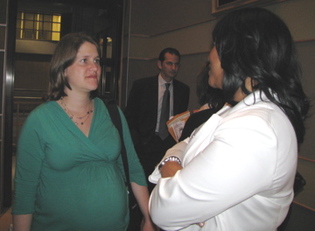Before the city sold her neighborhood’s school to Achievement First, Dwight Alderwoman Gina Calder (pictured) tried to add something in the deal for her neighbors.
At a meeting Tuesday night, the Board of Aldermen approved the sale of the Dwight School at 130 Edgewood Ave. for $4.51 million to Achievement First, the parent group of Amistad Academy. Achievement First plans to use the space for a K‑8 school in 2011, after a $31.5 million renovation.
The deal was delayed while Achievement First negotiated with the Greater Dwight Development Corporation on an agreement to let the neighborhood group continue use community space inside the school. An agreement was struck on May 16; both parties appeared at the board to applaud their new accord.
Calder also applauded the new Memorandum of Understanding between those groups, but she said it wasn’t enough.
The land sale allows the city to pay off $3 million in debt service and close a budget gap for the current fiscal year.
With all that money pouring into city coffers, Calder said on the aldermanic floor, “Our community is left asking, what does our community get out of this?”
The sale passed by a voice vote, with Calder the sole “nay.” Aldermen Robert Lee and Michelle Edmonds-Sepulveda abstained.
“I think [Amistad] will be a great community partner and neighbor,” Calder later explained, “however, there’re some community needs that still need to be met.”
In a closed-door Democratic caucus session before the vote, the Dwight alderwoman pitched two proposals to her fellow legislators that would have added tangible benefits for her neighbors.
The first proposal, according to Calder: “construction site vacancies would be first filled, when possible, from among qualified Dwight residents.”
A second proposal called for the city to devote $800,000 “to fund the acquisition and development of another site for a community center.” The money would have come from a combination of unspent capital project funds and surplus property sales.
The proposals, both supported by Edgewood Alderwoman Liz McCormack, “would have empowered and provided much needed opportunity for Dwight,” said Calder.
“Unfortunately, I did not get the support I needed from the city and my colleagues on the Board” to pass the amendments Tuesday, Calder said. What emerged from caucus, and passed through the board, were two watered-down proposals.
Aldermen questioned the legality of requiring construction contractors to hire Dwight residents. They opted instead to pass a non-binding resolution ordering Amistad Academy to “seek to recruit Dwight residents to work on the construction and rehabilitation of this new school.”
The board also passed an amendment calling for the city to look for sites for a community center — but without the part that required a funding commitment for acquiring the land. The amendment that passed ordered the city to conduct a six-month feasibility study “on the creation of community centers” in the city, and report back to the board.
On the aldermanic floor, Hill Alderman Jorge Perez applauded the latter amendment. He said it’s time to “walk the talk” and get serious about creating a community center. People across the city have long clamored for a new community space, especially after the Dixwell Q House closed.
Calder said both proposals stemmed from a feeling that neighbors were left out of the loop on the sale of the Dwight School.
When the city announced it was selling Dwight school this year, neighborhood activists felt blindsided. They had hoped to use the school for a community center and thought they had more time to get a plan together: Click here to read about that.
Despite the alderwoman’s dissatisfaction Tuesday, the leader of one active neighborhood group applauded how the Dwight deal worked out.
“I’m very happy with it,” said Linda Townsend-Maier, executive director of the Greater Dwight Development Corporation. Her group raised $600,000 towards the addition of a multi-purpose room and office space when the Dwight School was last renovated. The group had a Memorandum of Understanding with the Board of Education that allowed it to use the space when school was not in session.
The new MOU, signed a week ago, continues the old agreement and goes beyond. It gives the GDDC continued use of the all-purpose room, including during construction. It requires Amistad to reach out to neighborhood families to let them know how to apply to the school. It gives the GDDC four seats on the Amistad Academy Design Advisory Team. And it allows an office space and kitchen area to be used solely by the GDDC, the Dwight management team and the Montessori School on Edgewood Avenue.
 Achievement First plans a $31.5 million renovation, with the addition of a gym and media center. The group has already secured a $25.2 million state grant to fund the project, said Achievement First’s executive director, Dacia Toll (pictured).
Achievement First plans a $31.5 million renovation, with the addition of a gym and media center. The group has already secured a $25.2 million state grant to fund the project, said Achievement First’s executive director, Dacia Toll (pictured).
She said Achievement First is also pushing at the state Capitol for a bill that would allow for neighborhood preference in charter school admissions.
The city, under a mayor who has recently started publicly embracing Achievement First’s achievements, is standing fully behind the plan. In approving the sale, aldermen attached an amendment calling for the city to be a friend, not an obstacle, in helping the group get zoning approval for the school. They also stipulated that the charter school group won’t be stuck with a property tax bill in case there’s a lapse in time before it gets tax-exempt status. And they incorporated the MOU into the sale.
Townsend-Maier hailed the plans as a starting point for a good relationship.
“I’m very happy about the memorandum of understanding,” she said. “I’m hopeful that they’ll be a good neighbor.”